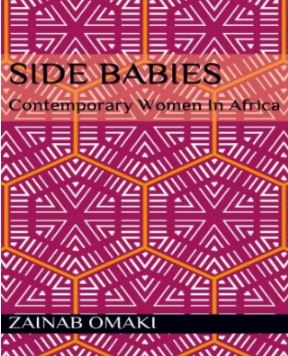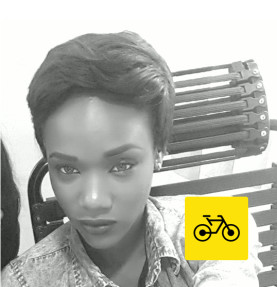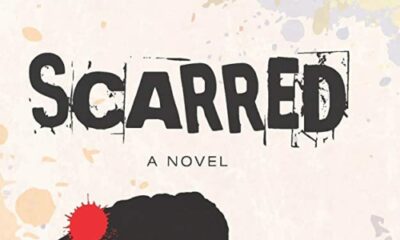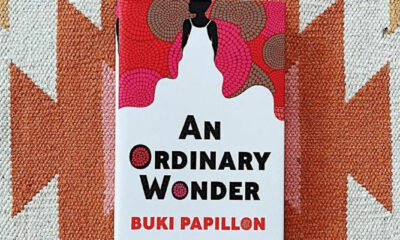Features
#LiterallyWhatsHot: Explore Past, Present, and Future Worlds through the Eyes of Zainab Omaki’s “Side Babies” and Main Ladies
 The term “Side Babies” evokes images of barely legal girls drinking expensive wine in a well-furnished university apartment while discussing the last Big Man that took them out to “dinner—code name for an orgasmic brunch where they’re served as the first course to a withered senator. This term also evokes images of their older colleagues, the Side Chicks who are often less oblivious to the fact that they’re not the leading ladies in a man’s life.
The term “Side Babies” evokes images of barely legal girls drinking expensive wine in a well-furnished university apartment while discussing the last Big Man that took them out to “dinner—code name for an orgasmic brunch where they’re served as the first course to a withered senator. This term also evokes images of their older colleagues, the Side Chicks who are often less oblivious to the fact that they’re not the leading ladies in a man’s life.
Despite the derogatory connotation of this term, Zainab Omaki has slapped this tag on her short story collection which chronicles the lives of contemporary African women beyond the flashlight often beamed on them as playthings. Side Babies, a short story mirroring the book’s title, lays out the life of pretty, young Lee’la who pitches her camp with “mad musician” Uncle M. This expert drummer, ten years older, is a highly strung version of those highlife sorts at Nigerian traditional weddings that can cajole even the most uptight madams into shaking their bums with reckless abandon. Omaki writes, “To watch him [Uncle M] play was to experience an unleashing of energy, a partnership between him and the drums.”
From their first meeting on a warm, music-infused night, Lee’la and Uncle M become inseparable even though he has three wives and seven children. While Uncle M is “bush”, Lee’la is cultured. Concerning her unlikely choice in a partner, I imagined she was intrigued, fascinated by his talent and mystique, maybe also bound by his overbearing personality. However, when Lee’la finally steps into the limelight, we learn that she is no ordinary Side Baby. This one is a real woman who knows what she wants and goes for it.
Laila, a returnee in the story “Reverse Culture Shock” is not afraid to come back to a country whose reputation in the media has outsiders clutching their gold. Instead of lamenting about the bloody patina in which Nigeria is often painted, Laila wades through traffic, intrusive family members, the general lack of political correctness, and the humidity. Through the craziness, she navigates her Nigerianess and even falls in love with it.
War and violence are familiar landscapes in this book with more than two stories bearing bullet imprints. In the plainly labeled story “War”, three lives are juxtaposed through a crisis that forces all humans to become equal. The heroine, Mischa, watches the world disintegrate from her perch where she juggles riotous thoughts and two men from separate worlds.
“The Dissolution of Love and State” follows two journalists who struggle to navigate their relationship while living in one half of a newly divided and slowly deteriorating country. Through the high points and curveballs thrown by life, as well as their proximity to news reports, we learn about fractured nations and the people fortunate (or unfortunate) enough to be in them.
“The Great Unlearning” is more essay than story. There, the life of a girl child is mapped from childhood to adulthood. Omaki, through carefully strung words, lashes out against viewpoints impressed on females by society and people who have long forgotten what it means to dream. It does read a bit like Miss Adichie’s feminism pieces, but even that is splendid literature.
Many short stories are usually dissatisfying, often leaving me angry, wondering what possessed the writer to end it the way they did. However, in reading Omaki’s book, I was deeply satisfied with the way she laid each character to rest, closed each chapter like a potter glazing finished pieces. Her writing is almost poetic, and there is no fear in her exploration of several narrative forms.
I like that Omaki breathes strength into Side Babies through unique dialogue and barely explored storylines. For each of the seven stories, I was sure of something new or so thoroughly refurbished that it was as good as new. Side Babies is one example of new African writing that allows women explore intricate insides, step out of cliché holding pods, and walk paths long forgotten. Many local and foreign writers could do better by emulating Zainab Omaki.
To experience the world through Zainab Omaki’s characters, get a copy of Side Babies here on the OkadaBooks store.
 Chiamaka Onu-Okpara is a freelance book editor who has experience editing fiction, creative non-fiction, and academic documents (Social Sciences and Humanities). She also writes fiction and poetry and has been published in Ake Review, Apex Magazine, and The Kalahari Review amongst other places. Her first poem is forthcoming in Strange Horizons.
Chiamaka Onu-Okpara is a freelance book editor who has experience editing fiction, creative non-fiction, and academic documents (Social Sciences and Humanities). She also writes fiction and poetry and has been published in Ake Review, Apex Magazine, and The Kalahari Review amongst other places. Her first poem is forthcoming in Strange Horizons.
To edit documents, contact her at [email protected]
Email her for reviews at [email protected]



























